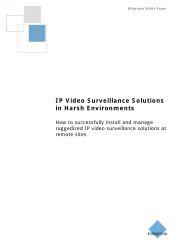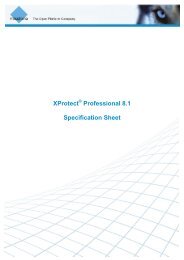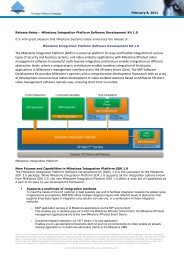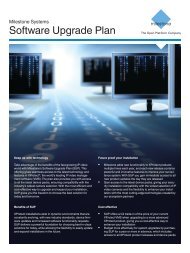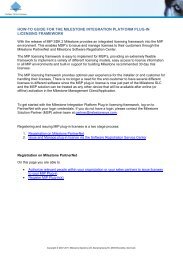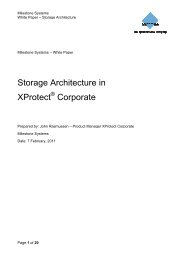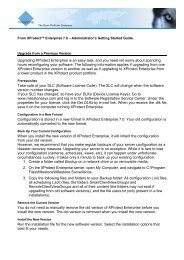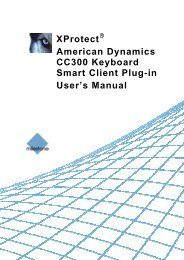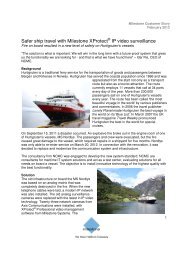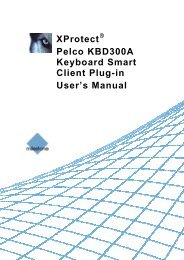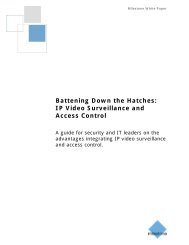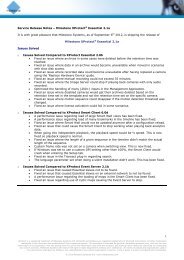XProtect Express 1.1; Administrator's Manual - Milestone
XProtect Express 1.1; Administrator's Manual - Milestone
XProtect Express 1.1; Administrator's Manual - Milestone
Create successful ePaper yourself
Turn your PDF publications into a flip-book with our unique Google optimized e-Paper software.
<strong>Milestone</strong> <strong>XProtect</strong> ® <strong>Express</strong> <strong>1.1</strong><strong>Administrator's</strong> <strong>Manual</strong>About archivingArchiving is an integrated and automated feature in <strong>XProtect</strong> <strong>Express</strong> with which recordings are moved to free upspace for new recordings. By default, recordings are stored in the <strong>XProtect</strong> <strong>Express</strong> database for each camera.The database for each camera is capable of containing a maximum of 600,000 records or 40 GB. <strong>XProtect</strong><strong>Express</strong> automatically archives (see "About archiving" on page 118) recordings if a camera's database becomesfull. Consequently, having sufficient archiving space is important.You do not have to do anything to enable archiving. It runs in the background and is automatically enabledand carried out from the moment <strong>XProtect</strong> <strong>Express</strong> is installed. The most recent recordings are saved on a localstorage in order to prevent network-related problems in the saving process.The default settings for <strong>XProtect</strong> <strong>Express</strong> is to perform archiving once a day, or if your database becomes full.You can change the settings for when and how often archiving takes place in the Management Application. Youcan also schedule archiving (see "About archiving schedules" on page 121) up to 24 times a day, with a minimumof one hour between each one. This way, you can proactively archive recordings, so databases will never becomefull. Basically, the more you expect to record, the more often you should archive.You can also change the retention time, which is the total amount of time you want to keep recordings from acamera (recordings in the camera's database as well as any archived recordings) under the properties of theindividual camera.<strong>XProtect</strong> <strong>Express</strong> automatically archives recordings if a camera's database becomes full. You only specify onetime limit (the retention time) as part of the general Recording and Archiving paths (on page 80) properties. Notethat retention time will determine when archiving takes place. Retention time is the total amount of time for whichyou want to keep recordings from a camera (that is recordings in the camera's database as well as any archivedrecordings).Backup of archivesCreating backups based on the content of camera databases is not recommended as it may cause sharingviolations or other malfunctions. Instead, create backups based on the content of archives. If you have notspecified separate archiving locations for separate cameras, you could back up the default local archivingdirectory, Archives.Important: When you schedule a backup, make sure the backup job does not overlap with any scheduledarchiving times.If archiving failsUnder rare circumstances, archiving may fail, for example due to network problems. However, in <strong>XProtect</strong><strong>Express</strong> this does not pose a threat. <strong>XProtect</strong> <strong>Express</strong> creates a new database and continues archiving in thisnew database. You can work with—and view—both this new database and the old one like any other databases.Benefits of archivingBy default, recordings are stored in the <strong>XProtect</strong> <strong>Express</strong> database for each camera. The database for eachcamera is capable of containing a maximum of 600000 records or 40 GB.However, the maximum size of a database is not in itself very important: If a database for a camera becomes full,<strong>XProtect</strong> <strong>Express</strong> automatically begins archiving its content, freeing up space in the database. Consequently,having sufficient archiving space is more important (see Storage Capacity Required for Archiving in the following).In addition to automatic archiving when a database becomes full, you can schedule archiving to take place atparticular times up to 24 times per day. This way, you can proactively archive recordings, so databases will neverbecome full.By using archiving, you will also be able to back up archived records on backup media of your choice, using yourpreferred backup software.www.milestonesys.com 118 Advanced configuration



